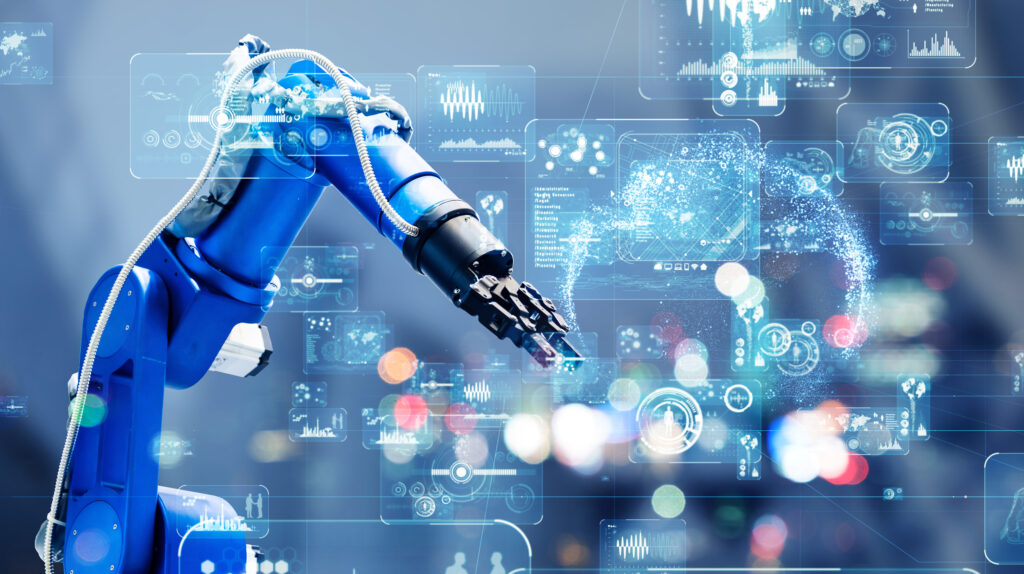Welcome to Thia.io.
This is my blog, where I reflect on how the future of manufacturing, research & development, and consumer insights is being redefined through the transformative power of generative AI.
In my articles, I attempt to dive deep into the world of artificial intelligence and discover how it’s revolutionizing industries, streamlining processes, and delivering unprecedented value.
All opinions are my own.

🔍 Why Thia.io?
- Expertise in Generative AI: At Thia.io, we share the cutting-edge domain of generative AI, ensuring you stay ahead of the curve in leveraging its potential.
- Industry-Specific Insights: Whether you’re in manufacturing, R&D, or keen on consumer insights, our content is tailored to meet the unique demands and challenges of your sector.
- Regular Newsletters: Stay updated with the latest trends, breakthroughs, and best practices in generative AI with our meticulously curated newsletters. Knowledge is power, and our newsletters ensure you’re always powered up!
- Rich Content Library: From in-depth articles and case studies to interactive webinars and tutorials, our content is designed to provide both beginners and experts with the knowledge they need to excel.
Benefits of Generative AI for Your Business:
- Innovative Product Design: Create groundbreaking products and designs that cater to market demands even before they arise.
- Efficient R&D: Streamline your research processes, reduce costs, and accelerate time-to-market.
- Deep Consumer Insights: Understand your consumers like never before, predicting their needs and preferences with unparalleled accuracy.
The manufacturing sector has always been at the forefront of adopting technological innovations. From the steam engines of the first industrial revolution to the automation and robotics of the third, each wave of technological advancement has transformed how we produce goods. Now, as we stand on the cusp of the fourth industrial revolution, generative AI is poised to redefine manufacturing once again.
How is Generative AI Impacting Manufacturing?

- Product Design and Prototyping: Traditional product design can be time-consuming and resource-intensive. Generative AI can quickly generate multiple design variations based on certain parameters or constraints. This not only speeds up the design process but also introduces innovative designs that might not have been conceived by human designers.
- Customization at Scale: One of the challenges in manufacturing has been to produce customized products at scale. Generative AI can create unique product designs based on individual customer preferences, allowing for mass customization without significant increases in production costs.
- Optimizing Production Processes: Generative AI can simulate and predict the outcomes of different production processes, helping manufacturers identify the most efficient and cost-effective methods. This can lead to reduced waste, faster production times, and lower costs.
- Supply Chain and Inventory Management: By predicting demand and optimizing supply chain processes, generative AI can help manufacturers maintain optimal inventory levels, reduce storage costs, and ensure timely delivery of products.
- Quality Control: Using generative models, manufacturers can simulate potential defects or issues in the production process. This predictive capability allows for proactive quality control, ensuring that products meet the desired standards before they reach the consumer.
For a comprehensive view of Top 12 AI Use Cases in Manufacturing, we have an extensive article with a good set of reference articles.
The Challenges Ahead

While the potential of generative AI in manufacturing is immense, there are challenges to consider:
- Data Privacy and Security: As with any AI application, the use of data comes with concerns about privacy and security. Manufacturers need to ensure that the data used by generative models is secure and used ethically.
- Skill Gap: The adoption of generative AI requires a workforce skilled in AI and data science. There’s a need for training and upskilling to ensure that the benefits of this technology are fully realized.
- Regulatory Concerns: As AI-generated products become more common, there will be questions about liability, intellectual property rights, and other regulatory concerns that need to be addressed.
Generative AI in R&D: Pioneering the Future of Research and Development
Research and Development (R&D) has always been the backbone of innovation across industries. It’s the crucible where new ideas are tested, refined, and transformed into groundbreaking products and solutions. With the advent of generative AI, the R&D landscape is undergoing a seismic shift, promising faster innovations, reduced costs, and a new era of discovery.

The Role of Generative AI in R&D:
- Accelerating Hypothesis Testing: In traditional R&D, hypothesis testing can be a lengthy process. Generative AI can simulate various scenarios or conditions, allowing researchers to quickly test multiple hypotheses and refine their research direction.
- Drug Discovery and Design: In the pharmaceutical industry, discovering a new drug can take years and billions of dollars. Generative AI can analyze vast datasets of molecular structures to predict potential drug candidates, significantly speeding up the discovery process and reducing costs.
- Material Science Innovations: Generative models can predict the properties of new materials or suggest modifications to existing ones. This can lead to the development of materials with desired properties, such as higher strength or better thermal conductivity.
- Optimizing Experimental Designs: Generative AI can suggest optimal experimental setups based on the desired outcomes, ensuring that resources are used efficiently and the chances of successful results are maximized.
- Predictive Modeling: Generative models can be used to predict the outcomes of certain research endeavors, allowing R&D teams to prioritize projects with higher chances of success.
- Enhancing Creativity: By generating novel ideas, patterns, or solutions, generative AI can act as a creative partner for researchers, sparking new avenues of exploration.
Challenges in Implementing Generative AI in R&D:
- Data Quality and Quantity: Generative AI models require vast amounts of data to train effectively. Ensuring the quality and relevance of this data is crucial.
- Interpretability: Understanding why and how a generative model arrives at a particular output can be challenging. This black-box nature can be a concern in critical R&D processes.
- Ethical Considerations: As AI begins to play a larger role in research, questions about authorship, intellectual property rights, and the ethical use of generated content arise.
- Over-reliance on AI: While AI can accelerate many R&D processes, human intuition, expertise, and critical thinking remain irreplaceable. Striking the right balance is essential.

Generative AI is not just a tool; it’s a transformative force in the world of R&D. By augmenting human capabilities, it promises to usher in an era of faster, more efficient, and more innovative research. As industries and institutions embrace this technology, the boundaries of what’s possible in R&D are set to expand exponentially.
Generative AI in Consumer Insights and Market Research: Decoding the Future of Consumer Behavior
In the ever-evolving landscape of business, understanding consumers is paramount. Consumer insights and market research have traditionally been the compass guiding businesses towards better products, improved services, and effective marketing strategies. Now, with the rise of generative AI, this compass is becoming even more precise, predictive, and powerful.

The Revolution of Generative AI in Consumer Insights:
- Predictive Consumer Behavior Modeling: Generative AI can simulate potential consumer behaviors based on historical data, allowing businesses to anticipate market trends, shifts in preferences, and emerging consumer needs.
- Personalized Marketing Campaigns: By analyzing consumer data, generative models can craft personalized marketing messages or suggest product recommendations tailored to individual preferences, enhancing the effectiveness of marketing campaigns.
- Virtual Focus Groups: Instead of traditional focus groups, generative AI can simulate consumer responses to new products or campaigns, providing instant feedback and reducing the time and cost associated with physical focus groups.
- Enhanced Data Visualization: Generative models can create intuitive and interactive visual representations of complex consumer data, making it easier for market researchers to identify patterns and insights.
- Scenario Analysis: Generative AI can simulate various market scenarios, helping businesses strategize for potential future challenges or opportunities.
- Content Creation for Surveys and Questionnaires: Generative models can craft questions or design surveys that are more likely to elicit meaningful responses from consumers, enhancing the quality of feedback.

Challenges and Considerations:
- Data Privacy: With increasing concerns about data privacy, businesses need to ensure that consumer data used to train generative models is obtained ethically and used responsibly.
- Bias and Representation: AI models, including generative ones, can inherit biases present in the training data. It’s crucial to ensure that these models provide insights that are representative of the diverse consumer base.
- Over-reliance on Technology: While generative AI offers powerful tools, human intuition and expertise in interpreting and acting on consumer insights remain vital.
- Accuracy and Validation: The predictions and outputs of generative models need to be validated against real-world data to ensure their accuracy and relevance.
💡 Join the AI Revolution! Don’t get left behind in the rapidly evolving landscape of industry 4.0. Join Thia.io and be part of the community that’s shaping the future. Whether you’re looking to implement generative AI in your business, or simply curious about its potential, Thia.io is your ultimate destination.
Generative AI is reshaping the landscape of consumer insights and market research. By offering predictive capabilities, personalized insights, and efficient feedback mechanisms, it promises a future where businesses can understand and cater to their consumers with unprecedented precision. As with any transformative technology, the key lies in its responsible and informed application. With the right approach, generative AI can be the beacon guiding businesses towards a future aligned with the evolving desires and needs of their consumers.
Subscribe now and unlock the limitless possibilities of generative AI!









